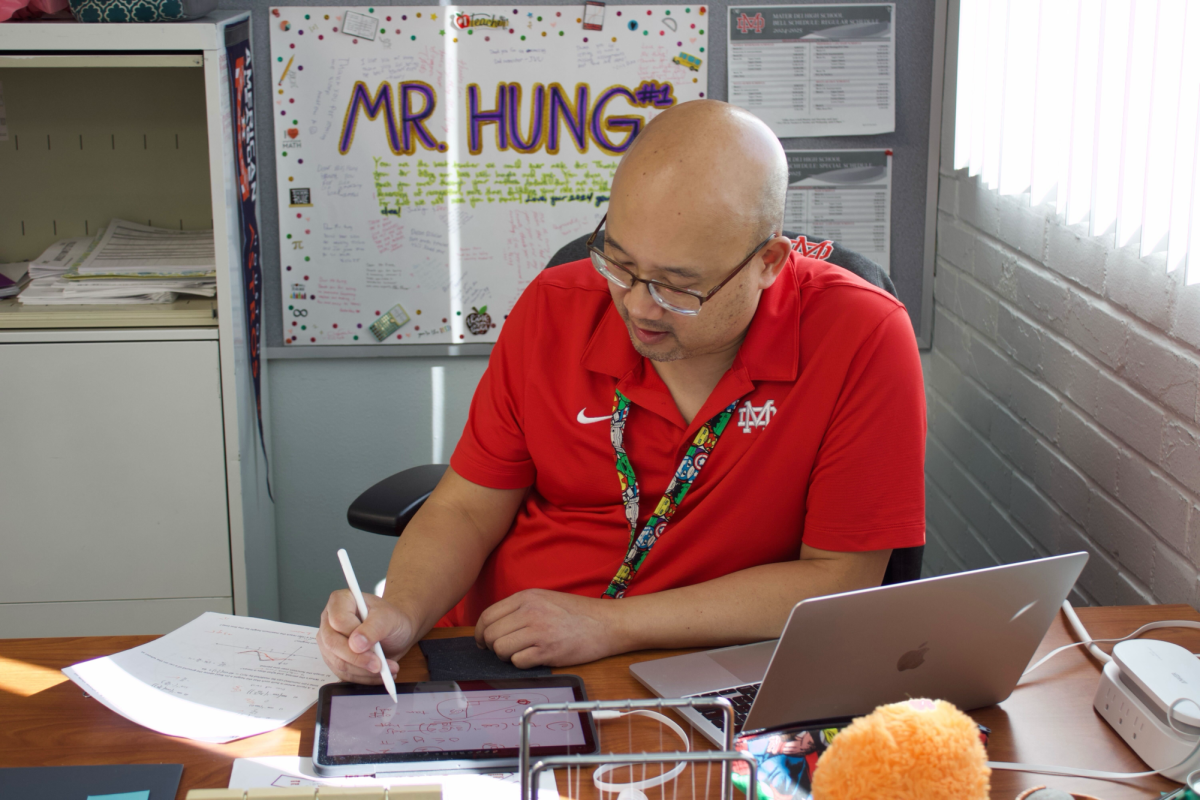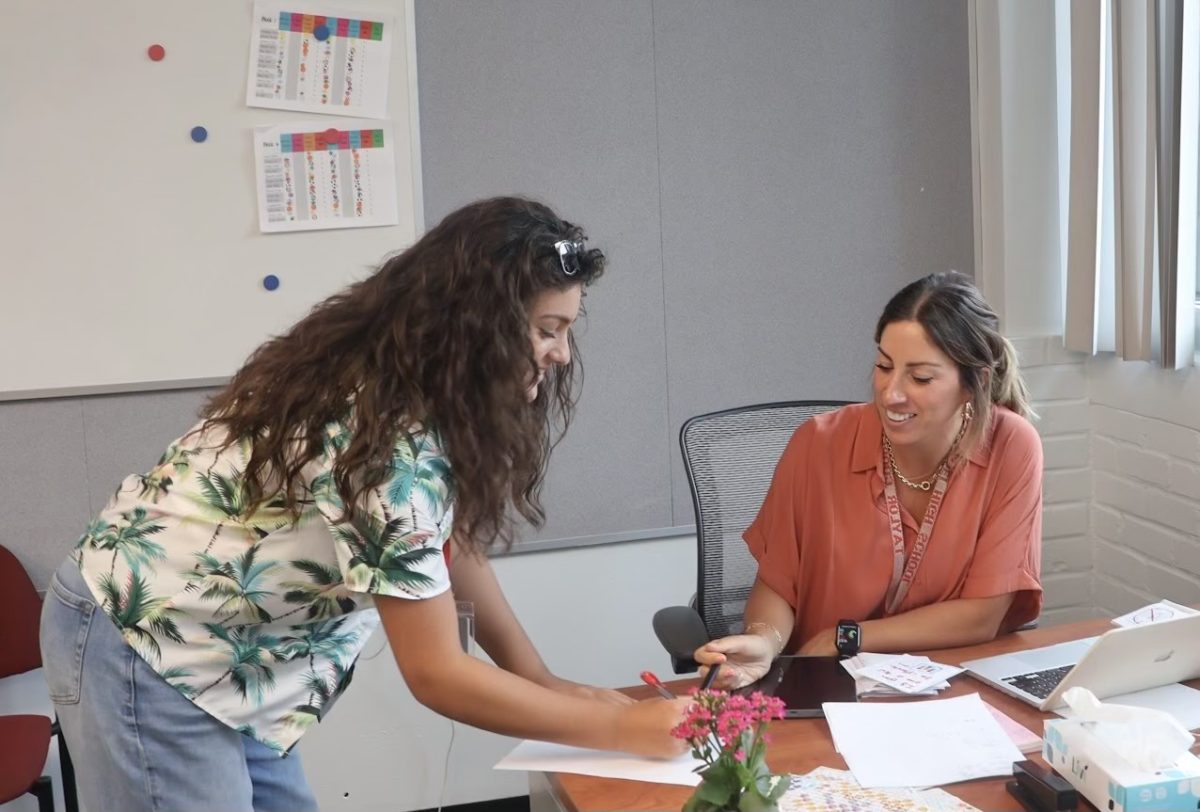Finding study strategies that truly resonate with your learning style is one of the best methods to finish the last preparation procedures. Math Teacher Eugene Hung has seen different approaches to study from students, specifically noting how building a supportive environment can reduce stress and create a positive atmosphere for focused work.
“One thing I’ve [been] hearing more about recently is students studying together,” Hung said. “I don’t mean studying the same content necessarily, but being in the same space, like at a library, café, or even someone’s home.”
Students who have been through finals season before have learned how to make the best use of their time and effort in their studies. Senior Lily Pham highlights the importance of planning and organization in her studying process, which she finds essential for keeping stress levels in check as finals approach.
Pham uses her past tests and quizzes to take notes and focus on areas she did not achieve the optimal results. She encourages others to follow a similar approach, as it helps prevent spending too much time on topics they have already mastered.
“I love to schedule my month beforehand to keep track of tests or assignments,” Pham said. “Creating a timetable that spreads out attention to each subject has been helpful.”
As a stellar academic student, Pham has been researching different methods of studying. She has learned that study aids and resources work the best for her to keep track of her notes and boost her understanding in major areas. Pham also recommends creating customized study guides as one of the most effective and efficient methods to review for exams.
“I prefer to create my own study guide for each unit,” Pham said. “I would highly recommend the YouTube channel RegisteredNurseRN [for anyone taking Anatomy and Physiology class], they have the best explanation and tips to memorize the hard concepts.”
Tackling Large Amounts of Material in Limited Time
Preparing for finals can seem intimidating when there is a lot of material to review in a short time frame. Hung offers key advice for students who need to simplify their study sessions. He believes in prioritizing certain topics and using the review materials provided by teachers, rather than forcing them to memorize everything in a short amount of time.
“It’s vital for students to pay close attention to review materials that teachers provide, rather than trying to cover everything from the semester equally,” Hung said. “And to schedule your study time smartly, especially in light of all the activities and festivities that crowd the calendar in December.”
Recognizing that staying focused can be a challenge for many students, Pham offers helpful tips to make study sessions more productive. Pham suggests creating a playlist of favorite music to help her stay engaged and make study time feel less tedious as well as study techniques such as the Pomodoro Method, which involves studying for 25 minutes followed by a 5-minute break to prevent burnout and renew study energy.
“I think [the] Pomodoro method is the method that I always do, which helped me to concentrate while not feeling overworked myself,” Pham said. “It improved my time management to catch up with my daily plan.”
Managing Time and Staying Calm During Exams
Exams can induce high-stress levels for many students, which is why solid preparation is crucial for easing anxiety and improving focus. By organizing study time effectively, practicing good time management, and maintaining a healthy balance of study and rest, students can approach exams with better confidence. Hung offers a technique that has helped both him and his students manage time effectively during finals. He recommends evaluating the entire exam at the start to keep up and avoid spending too much time on any single problem.
“I would usually allow for some buffer time, like maybe 15 minutes at the end of the test period,” Hung said. “If I encountered an especially tough question, I would attempt it, but then if I got stuck, I would move on before I spent too much time on it, making a note to come back to it later.”
For students who feel anxious during exams, Executive Director of Wellness Counseling Services Kellie Bauer has techniques to help students refocus when stress levels rise. Even simple techniques like box breathing can be extremely helpful in moments of high tensions.
“Try a breathing exercise, 4 seconds inhale, 4 seconds hold, 4 seconds exhale,” Bauer said. “Taking a moment of breathing exercises, particularly before a test, can be beneficial.”
Mental Health and Self-Care
High stress levels have physical, emotional, and psychological impacts on students’ performance and wellness. Even though each person has different responses to stress, negative thoughts can worsen one’s well being and life quality. Bauer emphasizes that practicing self-care is essential for success and encourages students to treat their mental health as a priority, not just during finals but throughout the year.
“Finals can be stressful, but prioritizing self-care is crucial for staying balanced,” Bauer advised. “Engaging in light physical activity, taking regular breaks during study sessions, staying hydrated, getting adequate sleep, and eating nourishing foods can relieve tension, refresh the mind, and maintain energy and focus.”
Sleep and rest play an important role in maintaining good mental and physical health. Bauer explains how sleep is critical for maintaining memory and cognitive function.
“Aim for 7-9 hours of sleep, sleep is critical for mood regulation, focus, and information retention,” Bauer said. “Putting all-nighters may seem productive, but they often lead to burnout and make it harder to perform well on exams.”
Pham highlights the importance of self-care and balance to maintain focus and motivation. For her, getting enough sleep, enjoying small treats, and studying with friends all contribute to a healthier mindset and a more effective study routine.
“I will treat myself to a simple snack or dessert that I love to level up my mood,” Pham said. “Going to the library or somewhere to study as a team with your friends would be the best way to review and check in your knowledge if all of you are enrolled in the same class.”
Dealing with anxiety and self-doubt during exams is challenging for lots of students. Hung shares his own strategies for managing and overcoming stress, which he believes can help students find peace during exams. When Hung was a student dealing with test anxiety, he often looked to his faith in God as a reminder for him to stay grounded and calm during these moments.
“My favorite verse in the entire Bible is 2 Corinthians 12.9. I use it as a reminder that God promises to provide everything I need,” Hung shared. “I think it can be helpful for students to remind themselves of what is in their hands and what is in God’s hands.”
Reflecting on his own experiences with test anxiety, Hung shares how he learned to let go of the need to control every outcome, which helps other students to not worry about matters out of their control.
“A lot of my own anxiety was really rooted in worries about trying to control the outcome of a test,” Hung said. “It’s taken me a long time to gradually embrace the simple reality that I can’t control outcomes”
Common Mistakes and How to Avoid Them
Common mistakes made during the exam preparation process can limit the effectiveness of students’ study efforts. To help students manage stress and revise information effectively, Hung suggests breaking down study sessions into manageable pieces to avoid last-minute pressure.
”Procrastination, of course, is a common trap that students fall into; I think that it often stems less from feeling lazy and more from feeling overwhelmed by the task of reviewing an entire semester’s worth of stuff for all your classes,” Hung said. “It’s better to refresh your memory by lightly touching upon all the topics you’ve covered, and then to zero in on the particular things you either struggled with or barely remember.”
Many students often overlook their own needs and the support available to them. Bauer hopes students will look out for signs that indicate they need both emotional and academic support. Some emotional support resources include connecting with school counselors and submitting the School Counselor/Wellness/CHOC Referral Form.
“Students should watch for signs of extreme fatigue, irritability, or feeling so overwhelmed that focusing on studies becomes difficult,” Bauer said. “Other red flags include difficulty sleeping, changes in appetite, or persistent feelings of anxiety or hopelessness.”
Academic support is just as important as emotional support, especially when students get confused or find a subject unmanageable despite efforts. The Academic Assistance Programs (AAP) provide students with additional support in their learning and academic performance through peer-tutoring and study sessions, as well as visiting teachers during Office Hours and outside tutoring options.
“It’s a good idea to seek academic support [by] visiting teachers during Office Hours, attending Academic Assistance Programs (AAP), or exploring outside tutoring options,” Bauer said.
One common mistake is waiting too long to ask for help. Hung advises students to reach out to their teachers as soon as possible instead of waiting until the last minute.
“Don’t wait until it’s nearly exam time to go and see your teachers,” Hung said. “If you delay, chances are high that many students will show up for help at the same time as you do, meaning your teachers will have to divide their attention among you and a bunch of other folks.”
Believe in Yourself
The faculty and staff at Mater Dei hope that students remember that their self-worth is not tied to test scores. Hung reminds students that their value as people is not determined by their academic performance.
“As much as I hope that students take finals seriously, I hope that they remember that their value as people, like their worthiness of love and their potential for living a meaningful and impactful life, is not dependent on how well they do on their exams,” Hung said. “In the Book of Isaiah, God says that we are so precious to Him that He tattoos our names onto His hands; I am certain He doesn’t have our GPAs jotted down next to them.”
Bauer also believes that success is not just about achieving high scores-it is about making the most of the preparation process, learning, and growing along the way.
“Believe in your efforts, and remember, you’ve done your best to prepare,” Bauer said. “Embracing a growth mindset and honoring their God-given talents allows students to develop their potential and strengthen their love for themselves and others, giving Glory to God. Viewing challenges as learning opportunities builds resilience and helps manage stress over time.”







![WORK TO SUCCEED By working these tips into their study schedule, students can reap the benefits of AP courses. With just a few easy lifestyle changes, and new methods before the test, students can see an increase in scores that other successful students have witnessed. “It‘s really about making sure that throughout the year you know what you're doing,” senior Angela Karanja said. “[Also] being calm the day of, so that you can remember everything that you learned [is helpful].” Infographic by Ava Gomez.](https://thescarletscroll.com/wp-content/uploads/2025/03/IMG_5210-1200x676.jpeg)
![A YEAR IN REVIEW
Between Nov. and Dec. 2024, 57 respondents voted for their favorite songs, artists, and albums. Every category had multiple options, and each one faced tight competition as the artists Sabrina Carpenter, Kendrick Lamar, and Billie Eilish battled for the top spots. Students like senior Payton Bauer encourages others to check out other popular singers, if they haven’t already. “I would say [listen to Carpenter] if you're [wanting to] feel good about yourself,” Bauer said. “Or maybe you just want something to work out or dance to. [Her music is] really fun.”](https://thescarletscroll.com/wp-content/uploads/2025/02/Orange-Black-Why-Vinyl-Records-Rock-Music-Infographic-e1738774839991.png)

![GETTING BETTER TOGETHER Mater Dei swimmers exert themselves at morning practice. As the season approaches, the swim team must discipline themselves for their early swim competitions. “Waking up early for practice is really hard, and getting yourself up in the morning and committing to the sport can be [difficult] at times,” Acevedo said.](https://thescarletscroll.com/wp-content/uploads/2025/10/img_9894-1200x800.jpg)
![FRIENDSHIP IN PRINT Members of the Hi-Lighter student newspaper gather for a press conference in 1954. Among them is senior Lenore Rigney (O’Hara), who had worked on the publication for two years after transferring to Mater Dei as a junior. “I found the students were all so friendly and accepting,” O’Hara said. “It was [important] to be friendly to someone new and to help them get used to the school and make friends.”](https://thescarletscroll.com/wp-content/uploads/2025/10/IMG_3582-1200x794.jpeg)



